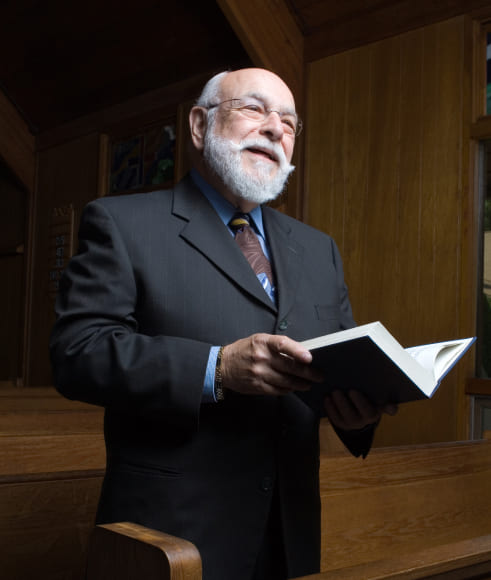Adventist congregations are dynamic and encompass a variety of ministries focused on teaching and serving members, visitors, and the community. Two figures are essential for managing the church, supporting the faithful, and helping with spiritual growth: the local pastor and the members of the eldership.
PASTOR
Pastors play a key role in leading a local church and in the various administrative levels of the Seventh-day Adventist Church. To serve as an Adventist minister, one must attend a college of theology and then be ordained to the pastoral ministry. Their various responsibilities to their congregations include:
Spiritual leadership: Adventist pastors are spiritual leaders and minister to church members through biblical teaching and spiritual counseling.
Ecclesiastical administration: Ministers are responsible for the administration of the local church. They lead church meetings, oversee the functioning of activities, and work with lay leaders to ensure that the church operates effectively.
Os mileritas, como ficaram conhecidos, acreditavam que a purificação do santuário mencionada no capítulo 8 do livro do profeta Daniel fosse a segunda vinda de Jesus. Milhares aguardavam ansiosos o dia em que entrariam na glória celestial. Mas o período passou, e nada aconteceu.
Pastoral Care: Adventist pastors care for the spiritual, emotional, and social needs of church members. They provide counseling and support in times of crisis, visit sick or needy members, and assist with family and individual issues.
Pastoring youth and families: Adventist pastors often play a significant role in discipleship of young people and strengthening families within the church. They organize youth programs and activities, offer marriage and family counseling and encourage spiritual growth in all age groups.
ANCIONATE
Elders have important responsibilities in the structure of Adventist congregations and in the lives of the members. The functions performed by these volunteer men and women include:
Spiritual leadership: On a day-to-day basis, they assist the pastor in the spiritual leadership of the local church. They deliver sermons and conduct Bible studies for the congregation and interested parties.
Church administration: They help with the administration of the church, collaborating with the pastor and other leaders to ensure the smooth running of the congregation’s activities. They can lead church meetings and help make important decisions.
Pastoral care: Elders are called to care for the physical and spiritual needs of church members. They can offer advice, support and encouragement in times of difficulty or crisis.
Os mileritas, como ficaram conhecidos, acreditavam que a purificação do santuário mencionada no capítulo 8 do livro do profeta Daniel fosse a segunda vinda de Jesus. Milhares aguardavam ansiosos o dia em que entrariam na glória celestial. Mas o período passou, e nada aconteceu.
Discipleship and teaching: Elders play a vital role in the discipleship of church members by encouraging spiritual growth and active involvement in the faith. They may lead Bible studies, small groups, and other teaching and spiritual formation activities.
Pastoring families and specific groups: Elders often pastor specific groups within the church, such as families, youth, seniors, and others. They strengthen these groups and provide support, guidance, and spiritual care.
Congregational representation: Elders often represent the congregation in administrative and pastoral matters. They may participate in local church committee or council meetings, as well as represent the church at community events.

FIND A CHURCH
You are always welcome! Find the closest Adventist church to your address and connect with a community ready to welcome you. Participate in moments of worship, inspiring events and opportunities for spiritual growth.
DECLARATIONS AND OFFICIAL DOCUMENTS
The official statements and documents of the Seventh-day Adventist Church express the denomination’s position on different issues, including contemporary ones, which seek to provide guidance and clarification for members and society.
WHO we are
**Discover the organizational structure of the Seventh-day Adventist Church, its commitment to helping others, and the Bible-based identity reflected in its beliefs and logo.**
OURbeliefs
Seventh-day Adventists accept the Bible as their rule of faith and practice, and hold fundamental beliefs as taught in the Holy Scriptures. They constitute the vision that the Adventist Church holds with respect to biblical teachings.
